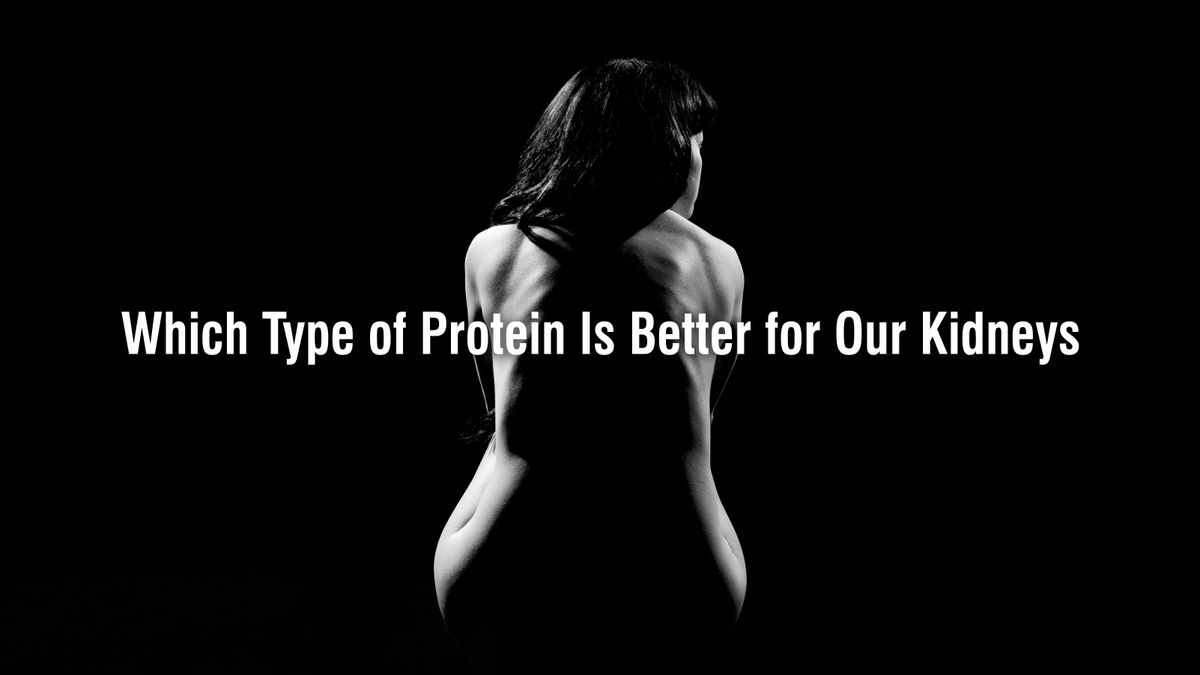(上篇)
從 1990 年到 2010 年的 20 年間,致死和致殘主因的排名相對保持穩定。心臟病仍是人類失去健康和生命的最主要原因,當然,也有一些疾病的名次下滑(例如愛滋病),但在發病率比上一代增加的疾病中,慢性腎臟病增加的幅度最大,死亡人數也增加了一倍。[1]
罪魁禍首就是「多肉嗜甜」的飲食習慣。[2]不加節制的糖、攝取高果糖的玉米糖漿都跟血壓和尿酸增加有關,從而破壞腎臟細胞。在動物性產品和垃圾食品中所含的飽和脂肪、反式脂肪及膽固醇,也跟腎功能受損有關。此外,肉類的蛋白質也會增加腎臟的酸負荷,提升氨的生成量,很可能破壞敏感的腎臟細胞。這就是為什麼醫生常常會建議慢性腎病患者要限制蛋白質的攝取量,防止腎功能進一步衰退。[3]
不過,並非所有蛋白質都生而平等。你必須了解,不是所有蛋白質對腎臟都有同樣的作用。這一點非常重要。
動物性蛋白攝取過多,可能會在腎絲球引發一種稱為「超過濾」(hyperfiltration)的高壓狀態,大幅增加腎臟的工作量,而對正常人的腎功能造成深遠的影響。假如超過濾只是偶爾發生,不至於危害到身體。我們的身體都內建了儲備的腎功能,因此可以只靠一個腎臟就能活下去。人類的身體,為了適應久遠以前的狩獵和採集生活,已經發產出間歇性處理大量蛋白質的能力。然而,現在很多人幾乎每天無肉不歡,攝取大量的動物性蛋白,日復一日下,迫使我們的腎臟必須持續召喚這些儲備力量。久而久之,這種持續不斷的壓力會讓原本健康的人腎功能惡化,這或許可以解釋為什麼隨著年齡增長,腎功能會每況愈下。[4]
至於吃蔬食的人腎功能比較好的原因,最初被認為是整體的蛋白質攝取量較低。[5]但我們現在知道,更可能的原因是腎臟處理動物性蛋白與植物性蛋白的方法非常不同。[6]
在吃肉後的幾個小時內,腎臟就會轉換成超過濾狀態,不管你吃的是牛肉、雞肉或魚,都有類似的結果。[7]反之,相同份量的植物性蛋白,對腎臟沒有明顯造成實質上的壓力。[8]吃鮪魚後的三小時內,腎臟的過濾率可以高達 36%;但在食用等量蛋白質的豆腐後,對腎臟似乎沒有施加任何額外的壓力。[9]
用植物性蛋白取代動物性蛋白,是否有助於延緩腎功能惡化呢?答案是肯定的。已有六項臨床試驗顯示,以植物性蛋白替代,可以減少超過濾和蛋白質滲漏的現象[7,10,11,12,13,14],但這些研究都是短期性的,試驗期都少於八週。一直到 2014 年,終於有一項長達六個月的隨機、有安慰劑對照的雙盲臨床試驗,研究腎臟如何處理大豆蛋白與乳製品蛋白。結果與其他研究相符,發現植物性蛋白能幫助生病的腎臟維持功能。[15]
為什麼動物性蛋白會造成超載反應,而植物性蛋白卻不會呢?這是由於動物性產品會引起發炎。研究人員發現如果在受試者食用動物性蛋白的同時,也給予強烈的抗炎藥,超過濾反應和蛋白質滲漏的情況就都會消失。[16]
延伸閱讀:
減少酸負荷,才能活得更長久
內容來源:
食療聖經 How not to die
研究出處:
[1] US Burden of Disease Collaborators. The State of US Health, 1990-2010: Burden of Diseases, Injuries, and Risk Factors. JAMA. 2013 Aug 14;310(6):591-608
[2] Odermatt A. The Western-style diet: a major risk factor for impaired kidney function and chronic kidney disease.Am J Physiol Renal Physiol. 2011 Nov;301(5):F919-31.
[3] van den Berg E, Hospers FA, Navis G, et al. Dietary acid load and rapid progression to end-stage renal disease of diabetic nephropathy in Westernized South Asian people. J Nephrol. 2011 Jan-Feb;24(1):11-7.
[4] Piccoli GB, Vigotti FN, Leone F, et al. Low-protein diets in CKD: how can we achieve them? A narrative, pragmatic review. Clin Kidney J. 2015 Feb;8(1):61-70.
[5] BM Brenner, TW Meyer, TH Hostetter. Dietary protein intake and the progressive nature of kidney disease: the role of hemodynamically mediated glomerular injury in the pathogenesis of progressive glomerular sclerosis in aging, renal ablation, and intrinsic renal disease. N Engl J Med. 1982 Sep 9;307(11):652-9.
[6] Wiseman MJ, Hunt R, Goodwin A, Gross JL, Keen H, Viberti GC. Dietary composition and renal function in healthy subjects. Nephron. 1987;46(1):37-42.
[7] Nakamura H, Takasawa M, Kashara S, Tsuda A, Momotsu T, Ito S, Shibata A. Effects of acute protein loads of different sources on renal function of patients with diabetic nephropathy. Tohoku J Exp Med. 1989 Oct;159(2):153-62.
[8]Simon AH, Lima PR, Almerinda M, Alves VF, Bottini PV, de Faria JB. Renal haemodynamic responses to a chicken or beef meal in normal individuals.Nephrol Dial Transplant. 1998 Sep;13(9):2261-4.
[9] P Kontessis, S Jones, R Dodds, R Trevisan, R Nosadini, P Fioretto, M Borsato, D Sacerdoti, G Viberti. Renal, metabolic and hormonal responses to ingestion of animal and vegetable proteins. Kidney Int. 1990 Jul;38(1):136-44.
[10] Azadbakht L, Shakerhosseini R, Atabak S, Jamshidian M, Mehrabi Y, Esmaill-Zadeh A. Beneficiary effect of dietary soy protein on lowering plasma levels of lipid and improving kidney function in type II diabetes with nephropathy.Eur J Clin Nutr. 2003 Oct;57(10):1292-4.
[11] Kontessis PA, Bossinakou I, Sarika L, et al. Renal, metabolic, and hormonal responses to proteins of different origin in normotensive, nonproteinuric type I diabetic patients. Diabetes Care. 1995 Sep;18(9):1233.
[12] SR Teixeira, KA Tappenden, L Carson, R Jones, M Prabhudesai, WP Marshall, JW Erdman Jr. Isolated soy protein consumption reduces urinary albumin excretion and improves the serum lipid profile in men with type 2 diabetes mellitus and nephropathy. J Nutr. 2004 Aug;134(8):1874-80.
[13] Stephenson TJ, Setchell KD, Kendall CW, Jenkins DJ, Anderson JW, Fanti P. Effect of soy protein-rich diet on renal function in young adults with insulin-dependent diabetes mellitus. Clin Nephrol. 2005 Jul;64(1):1-11.
[14] Jibani MM, Bloodworth LL, Foden E, Griffiths KD, Galpin OP. Predominantly vegetarian diet in patients with incipient and early clinical diabetic nephropathy: effects on albumin excretion rate and nutritional status. Diabet Med. 1991 Dec;8(10):949-53.
[15] Bosch JP, Saccaggi A, Lauer A, Ronco C, Belledonne M, Glabman S. Renal functional reserve in humans. Effect of protein intake on glomerular filtration rate. Am J Med. 1983 Dec;75(6):943-50.
[16] ZM Liu, SC Ho, YM Chen, N Tang, J Woo. Effect of whole soy and purified isoflavone daidzein on renal function--a 6-month randomized controlled trial in equol-producing postmenopausal women with prehypertension. Clin Biochem. 2014 Sep;47(13-14):1250-6.

